
 |
 |
 |
Memberships
| |
Membership periods are 12 weeks in length and begin on set dates. You can still JOIN AT ANY TIME; you will have a pro-rated membership that will take you to the following renewal date. We have permanent classes for beginners, so you can JOIN AT ANY TIME THROUGHOUT THE YEAR. We also separate students according to their experience and skill level which allows them to progress at their own pace, and continue to be challenged and motivated.
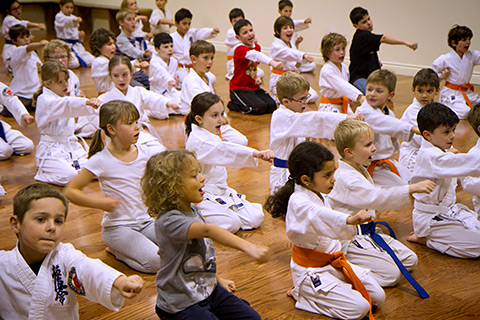
|
Grading and Promotion
| |
Belt rankings follow basic requirements for each respective level as outlined by the WIK/KDL syllabus of minimum belt requirements. Formal gradings are held twice per year, but also minor gradings can be held at any time during a regular class or a special grading class. Gradings will not always be announced in advance, so students should work hard during every class and be prepared at all times.
All students will be issued a BUDO PASSPORT when joining the dojo. It will be used to keep a record of your participation and accomplishments. The student will be responsible for maintaining it and the information contained within will be one of the criteria used for gradings. Click here to download all the details regarding the BUDO PASSPORT.
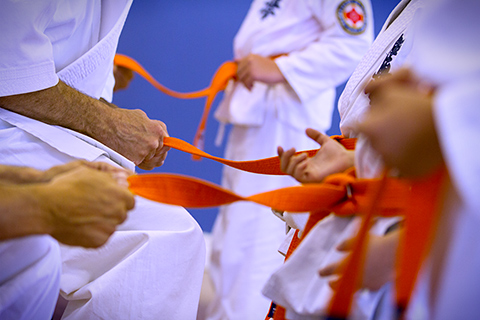
Only the instructor knows each student and his/her capabilities, and although we follow the grading syllabus, there are other factors that make each person’s grading unique. Promotions are given at the instructor's discretion, and it is extremely disrespectful and very poor etiquette by a student or parent to ask when one is to be graded or to dispute the outcome of a grading. It is important to have trust in the instructor’s judgment.
There are grading fees for every belt promotion and they vary according to the level.
|
Your DOGI (Uniform)
| |
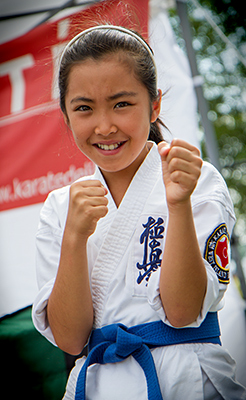 The uniform used in traditional karate schools is called a dogi and consists of two parts: the top or kimono, and the pants. The dogi worn in the dojo is white or natural white following the philosophy that everyone training is equal regardless of social status, occupation, sex, race or religion. The top is worn with the left lapel on the outside and may be fastened with the strings located on the sides. Not all dogis have these ties; your belt is the primary way to keep the top closed.
The uniform used in traditional karate schools is called a dogi and consists of two parts: the top or kimono, and the pants. The dogi worn in the dojo is white or natural white following the philosophy that everyone training is equal regardless of social status, occupation, sex, race or religion. The top is worn with the left lapel on the outside and may be fastened with the strings located on the sides. Not all dogis have these ties; your belt is the primary way to keep the top closed.
Your dogi should always be kept clean and tidy, and any rips or tears repaired quickly.
Nothing is to be worn under the top of your gi with an exception made for women. Women may wear a white T-shirt or appropriate sports top.
|
How To Tie Your OBI (Belt)
| |
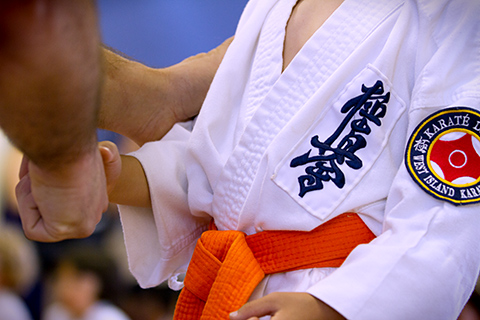
The obi (belt) is used primarily to keep your dogi top from opening.
- Fold your belt in half and find the center.
- Place the center just below your navel and wrap both ends around your waist bringing the tips back to the front. Make sure not to twist the belt and that the ends are even.
- Bring the left over the right and tuck under both parts in front of your waist and pull ends left and right to form the first knot.
- Bring the top over the bottom and tie your second knot pulling left and right (horizontally).
An obi should always be respected but not revered. It contains symbolic meaning. You can tell a lot about someone and their attitude just by the care they wear and treat their obi.
- Do not drop or have it drag on the floor. This denotes carelessness and disrespect.
- Never wash your obi even if it stiff and difficult to keep tied. Only by tying and untying it will you *break* it in, meaning you must train often. It is said that your training spirit and hard work (including your sweat and sometimes blood) lie in your belt, and if you wash it, you are cleansing this spirit away.
|
Dojo Etiquette
| |
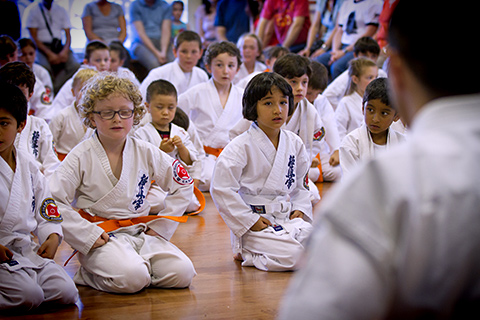
- Students will bow and say "Osu" when entering or leaving the dojo or training area.
- Proper respect should be shown to all senior belts.
- Prior to addressing a senior belt, students should bow and say "Osu".
- No shoes shall be worn in the dojo.
- Students must warm up with a minimum amount of noise before training.
- Black belts are addressed in the following manner:
- "Shihan" (5th dan and above)
- "Sensei" (3rd and 4th dan)
- "Sempai" (1st and 2nd dan)
- No student will leave the class without the instructor’s permission.
- Only a clean white dogi will be worn and any rips or tears must be promptly repaired.
- Finger and toenails must be trimmed short; students must be clean. Training involves close proximity with others and can be unpleasant for a partner if this rule is not followed.
- Any jewelry must be removed before class.
- Talking during class will not be tolerated.
- Students will refrain from gossip or disparaging remarks towards other students or martial arts.
- All students shall conduct themselves in such a way as to reflect favorably upon themselves, their instructor and the dojo.
|
|
|
 |
|
|
 |
|
|
|
 © Copyright 1996. All rights reserved by West Island Karate ®.
© Copyright 1996. All rights reserved by West Island Karate ®.
 |
|
|